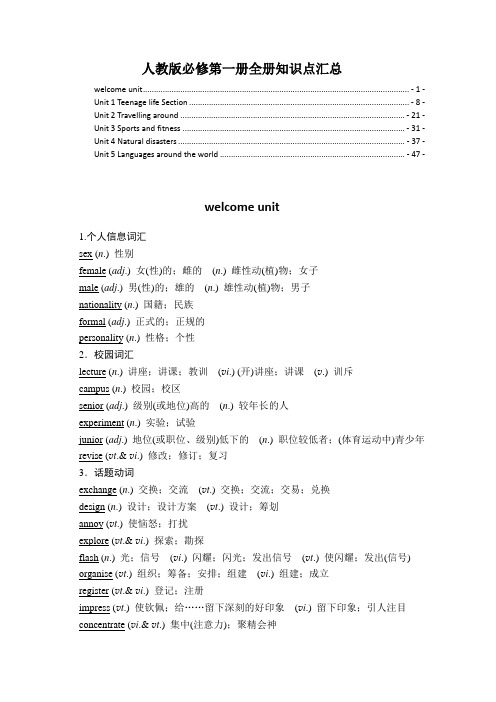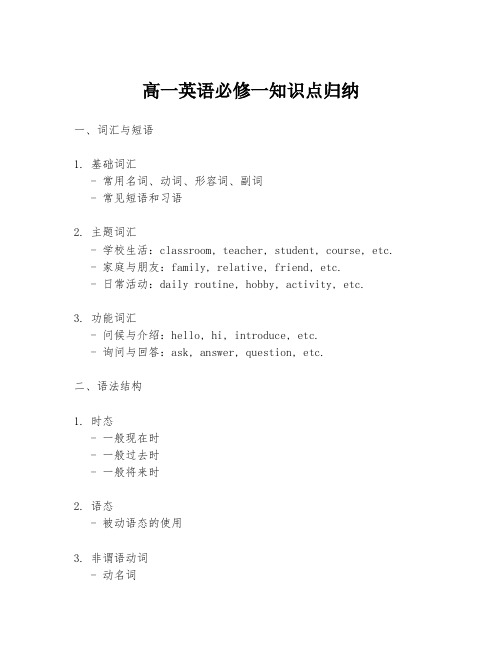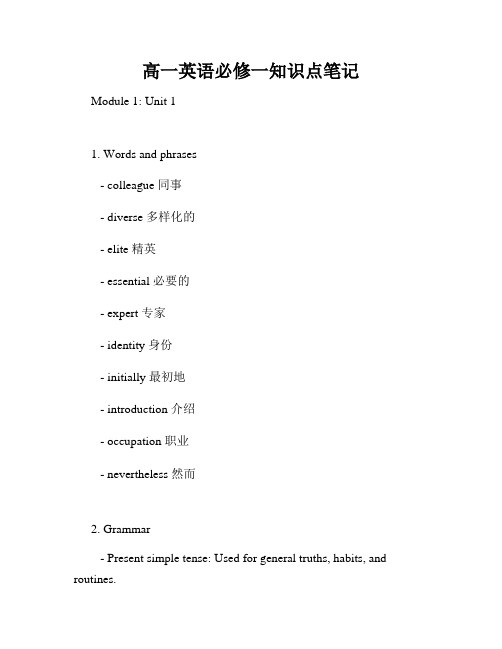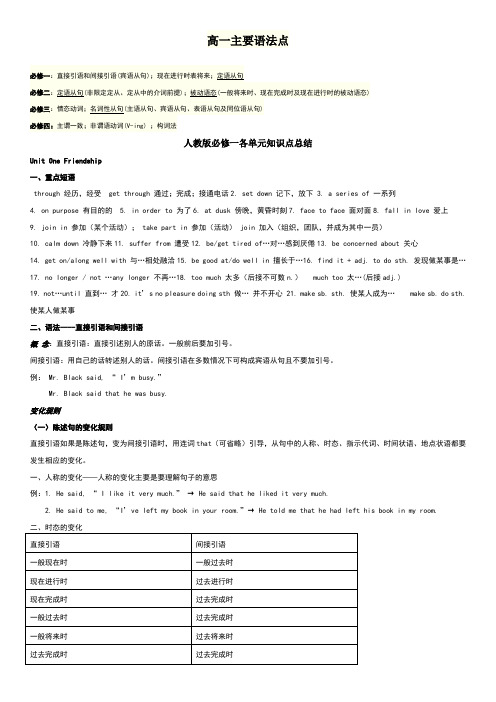高中必修一各单元英语知识点
高中英语必修一第一单元知识点

高中英语必修一第一单元知识点一、词汇与短语1. 词汇- 基础词汇:问候、介绍、数字、颜色、职业、日常用品等。
- 扩展词汇:描述人物特征、表达喜好、日常活动相关词汇。
2. 短语- 问候用语:Hello, Hi, Good morning/afternoon/evening.- 自我介绍:My name is..., I come from..., I am...- 询问与回答:What's your name?, How old are you?, Where do you come from?- 表达喜好:I like/don't like..., I'm interested in..., My favorite...二、语法1. 时态- 一般现在时:表示经常发生的动作或状态。
- 一般过去时:表示过去发生的动作或状态。
2. 句型- 肯定句、否定句和疑问句的构成。
- 特殊疑问句的构成:Who, What, Where, When, Why, How。
3. 代词- 人称代词主格和宾格的使用。
- 物主代词形容词性和名词性的区别。
4. 介词- 常用介词:in, on, at, for, with, by, of, about, from, to, from...to...三、听力与口语1. 听力- 理解日常对话和短文。
- 抓住关键信息,如人名、地点、时间和数字。
2. 口语- 进行简单的自我介绍和日常对话。
- 描述人物和事物,表达个人意见和喜好。
四、阅读与写作1. 阅读- 阅读并理解简短的文章和对话。
- 通过上下文猜测生词的意思。
2. 写作- 写简短的自我介绍。
- 描述人物、地点或事件。
五、文化知识1. 了解英语国家的基本文化习俗。
2. 学习与日常生活相关的英语国家节日和传统。
六、学习策略1. 制定学习计划,合理安排学习时间。
2. 利用多种资源和工具辅助学习,如词典、录音和在线资源。
新教材 人教版高中英语必修第一册全册各单元知识点提炼汇总(单词短语语法写作等)

人教版必修第一册全册知识点汇总welcome unit ......................................................................................................................... - 1 - Unit 1 Teenage life Section .................................................................................................... - 8 - Unit 2 Travelling around ...................................................................................................... - 21 - Unit 3 Sports and fitness ..................................................................................................... - 31 - Unit 4 Natural disasters ....................................................................................................... - 37 - Unit 5 Languages around the world .................................................................................... - 47 -welcome unit1.个人信息词汇sex (n.) 性别female (adj.) 女(性)的;雌的(n.) 雌性动(植)物;女子male (adj.) 男(性)的;雄的(n.) 雄性动(植)物;男子nationality (n.) 国籍;民族formal (adj.) 正式的;正规的personality (n.) 性格;个性2.校园词汇lecture (n.) 讲座;讲课;教训(v i.) (开)讲座;讲课(v.) 训斥campus (n.) 校园;校区senior (adj.) 级别(或地位)高的(n.) 较年长的人experiment (n.) 实验;试验junior (adj.) 地位(或职位、级别)低下的(n.) 职位较低者;(体育运动中)青少年revise (v t.& v i.) 修改;修订;复习3.话题动词exchange (n.) 交换;交流(v t.) 交换;交流;交易;兑换design (n.) 设计;设计方案(v t.) 设计;筹划annoy (v t.) 使恼怒;打扰explore (v t.& v i.) 探索;勘探flash (n.) 光;信号(v i.) 闪耀;闪光;发出信号(v t.) 使闪耀;发出(信号) organise (v t.) 组织;筹备;安排;组建(v i.) 组建;成立register (v t.& v i.) 登记;注册impress (v t.) 使钦佩;给……留下深刻的好印象(v i.) 留下印象;引人注目concentrate (v i.& v t.) 集中(注意力);聚精会神improve (v i.& v t.) 改进;改善4.话题描述性词汇anxious (adj.) 焦虑的;不安的annoyed (adj.) 恼怒的;生气的frightened (adj.) 惊吓的;害怕的outgoing (adj.) 爱交际的;外向的awkward (adj.) 令人尴尬的;难对付的confident (adj.) 自信的;有把握的curious (adj.) 好奇的;求知欲强的forward (ad v.) (also forwards) 向前;前进(adj.) 向前的;前进的5.话题名词registration (n.) 登记;注册;挂号nation (n.) 国家;民族;国民designer (n.) 设计者impression (n.) 印象;感想confidence (n.) 信心;信任guy (n.) 小伙子;男人;家伙organisation (n.) 组织;团体;机构goal (n.) 目标;球门;射门strategy (n.) 策略;策划partner (n.) 同伴;配偶;合伙人company (n.) 公司;商行;陪伴style (n.) 方式;作风6.话题短语senior_high_school 〈美〉高中at_last 终于;最终make_an_impression 留下好印象what_if 要是……会怎么样呢concentrate_on 集中精力于leave ... alone 不打扰;不惊动junior_high_school 〈美〉初级中学look_forward_to 盼望,期待take_notes 记笔记flash_card 教学卡片;识字卡重点知识合作探究Our school invited two engineers to design_a_language_lab_for_us.我们学校邀请了两位工程师为我们设计一个语言实验室。
高一英语必修1笔记

高一英语必修1笔记
以下是高一英语必修1的一些重要知识点和笔记,供您参考:Unit 1
1. 重点单词和短语:
welcome to the unit: 欢迎来到这个单元
introduce: 介绍
represent: 代表
include: 包括
foundation: 基础
generation: 一代人
determine: 决定
2. 语法重点:
现在进行时态(现在正在进行的动作)
过去进行时态(过去某个时间正在进行的动作)
3. 写作练习:
写一篇介绍自己学校的文章,包括学校的设施、历史和特色等。
Unit 2
1. 重点单词和短语:
introduction: 介绍
composition: 作文
request: 请求
submission: 提交
deadline: 最后期限
script: 剧本
2. 语法重点:
现在完成时态(到现在为止已经完成的动作)
现在完成进行时态(从过去某个时间到现在一直在进行的动作)3. 听力练习:
听一段对话或文章,回答有关时间、地点、人物等问题。
Unit 3
1. 重点单词和短语:
technology: 技术
application: 应用
revolution: 革命
communication: 交流
device: 设备
2. 语法重点:
一般将来时态(将来的动作)
一般将来进行时态(将来某个时间正在进行的动作)
3. 阅读练习:
阅读一篇有关未来科技的文章,回答有关未来科技的问题。
高中英语(新人教版)必修一知识点归纳

高中英语必修一知识点归纳Welcome Unit知识点归纳Part one Vocabulary1. exchange n.交换;交流vt.交换;交流;交易;兑换In exchange (for...)作为(与......的)交换exchange student 交换生exchange A for B 以A交换B:把A兑换成B exchange sth. with sb. 与某人交流/交换某物exchange opinions/ideas/views交流意见/想法/看法2. design1) n. 设计;图案;构思;打算,意图。
make designs for 为......做设计by design(=on purpose)故意地2) vt.设计,构思;计划;意欲。
design sth. for... 为...设计某物be designed to do... 旨在做...,用于做...3. anxious adj. 焦虑的;不安的be anxious for sb./ about sth. 为某人/某事担心be anxious for...渴望...be anxious (for sb.) to do sth. 渴望(某人)做某事be anxious that... 渴望...4. annoyed adj. 恼怒的;生气的be annoyed with sb.生某人的气be annoyed at/about sth.因某事生气be annoyed to do做...感到生气5. senior adj. 级别(或地位)高的n. 较年长的人senior high (school)高中be senior to sb. 比某人的地位/职位高6. impress vt. 使钦佩;给……留下深刻的好印象vi. 留下印象;引人注目have a(n) ...impression of... 对······有······印象leave/make a(n) ...impression on sb. 给某人留下······印象(be) under the impression that... 以为······,(通常指)误认为······7. concentrate on 集中精力于8. leave...alone 不打扰,不惊动9. explore vt.& vi. 探索;勘探exploration n. 探索,探测explorer n. 探险者;勘探者;考察者10. confident adj. 自信的;有把握的be confident about 对......有信心be confident of (doing) sth.对(做)······有把握be confident that... 确信······11. look forward to 盼望;期待12. organise vt. 组织;筹备;安排;组建vi. 组建;成立organisation n. 组织;团体;机构Part two Grammar句子成分和基本句型一、句子成分构成句子的各个部分叫作句子成分。
高一英语必修一知识点归纳

高一英语必修一知识点归纳一、词汇与短语1. 基础词汇- 常用名词、动词、形容词、副词- 常见短语和习语2. 主题词汇- 学校生活:classroom, teacher, student, course, etc. - 家庭与朋友:family, relative, friend, etc.- 日常活动:daily routine, hobby, activity, etc.3. 功能词汇- 问候与介绍:hello, hi, introduce, etc.- 询问与回答:ask, answer, question, etc.二、语法结构1. 时态- 一般现在时- 一般过去时- 一般将来时2. 语态- 被动语态的使用3. 非谓语动词- 动名词- 分词(现在分词和过去分词)4. 句型- 简单句- 并列句- 复合句(定语从句、状语从句等)三、阅读理解1. 阅读技巧- 快速阅读(Skimming)- 精读(Scanning)- 推断与预测2. 文章类型- 记叙文- 议论文- 说明文3. 常见问题类型- 事实细节题- 主旨大意题- 推理判断题四、写作技巧1. 写作格式- 书信- 日记- 议论文2. 写作要点- 明确主题 - 逻辑清晰 - 语言准确3. 写作技巧- 使用连接词 - 段落结构 - 多样句式五、听力技巧1. 听力策略- 预测- 注意力集中 - 关键词捕捉2. 听力材料- 对话- 短文- 讲座3. 听力题型- 信息匹配 - 细节理解 - 推理判断六、口语表达1. 发音- 音标学习- 单词发音- 句子重音和语调2. 日常对话- 问候与告别- 邀请与应答- 请求帮助3. 讨论与演讲- 表达观点- 支持论点- 结束语请注意,以上内容是一个基础框架,您可以根据具体的教学大纲和学生的学习情况进行调整和补充。
在Word文档中,您可以使用标题、子标题、列表和表格等格式化工具来使文档更加清晰和专业。
此外,为了确保文档的可编辑性和可操作性,建议使用清晰和标准的字体,如Times New Roman或Arial,并确保文档的页边距、行距和段落格式符合标准文档的要求。
高一必修一英语单词知识点

高一必修一英语单词知识点英语作为一门国际语言,对于我们学生来说是非常重要的一门课程。
而在英语学习的过程中,掌握单词的意思和用法就显得尤为关键。
本文将为大家总结高一必修一中的一些重要词汇知识点,希望对大家的英语学习有所帮助。
第一单元:Unit 1 Friendship 友谊在这个单元中,我们学习了一些描述人际关系的词汇。
比如:"friend"(朋友),"relationship"(关系),"trust"(信任),"loyalty"(忠诚)等等。
在我们平时的生活中,这些词汇经常用到,因此我们需要牢记它们的意思和用法。
第二单元:Unit 2 English around the world 英语世界在这个单元中,我们学习了一些与英语国际化相关的词汇。
比如:"globalization"(全球化),"lingua franca"(通用语),"accent"(口音),"bilingual"(双语的),"fluency"(流利)等等。
这些词汇对于我们了解更多关于英语的文化和在全球范围内的使用都是非常重要的。
第三单元:Unit 3 Travel 行旅在这个单元中,我们学习了一些与旅行有关的词汇。
比如:"destination"(目的地),"tourist"(游客),"voyage"(航海),"adventure"(冒险),"accommodation"(住宿)等等。
这些词汇可以帮助我们更好地描述旅行的经历和计划,为我们的旅行增添乐趣。
第四单元:Unit 4 How life began 生命如何开始在这个单元中,我们学习了一些与生物学和地理学相关的词汇。
高一英语必修一知识点笔记

高一英语必修一知识点笔记Module 1: Unit 11. Words and phrases- colleague 同事- diverse 多样化的- elite 精英- essential 必要的- expert 专家- identity 身份- initially 最初地- introduction 介绍- occupation 职业- nevertheless 然而2. Grammar- Present simple tense: Used for general truths, habits, and routines.Example: The earth revolves around the sun.- Present continuous tense: Used for ongoing actions or temporary situations.Example: I am studying English at the moment.- Present simple vs. present continuous: The present simple is used for general truths, while the present continuous tense is used for actions happening at the moment of speaking.Example: She always drives to work. (Present simple)She is driving to work now. (Present continuous)- Adverbs of frequency: Used to indicate the frequency of an action.Example: I often go to the gym.Module 1: Unit 21. Words and phrases- accomplish 完成- ambition 雄心- conscious 有意识的- fulfill 实现- goal 目标- grateful 感激的- influence 影响- motivation 动机- overcome 克服- passion 热情2. Grammar- Modal verbs: Used to express ability, possibility, permission, and necessity.Example: You can call me later. (Permission)They must be at the airport by now. (Necessity)- Conditional sentences: Used to express outcomes based on certain conditions.Example: If it rains, we will stay at home.- Passive voice: Used when the subject of the sentence is acted upon.Example: The book was written by Mark Twain.- Indirect speech: Used to report what someone else said.Example: She said that she was tired.Module 2: Unit 11. Words and phrases- adapt 适应- behavior 行为- communicate 交流- conflict 冲突- contribute 贡献- ignorance 无知- respect 尊重- tolerate 容忍- value 价值观- viewpoint 观点2. Grammar- Comparative and superlative forms of adjectives: Used to compare two or more things.Example: He is taller than his sister. (Comparative)It is the most beautiful city in the world. (Superlative)- Adverbs of manner: Used to describe the way an action is performed.Example: She sings beautifully.- Conditional sentences (second and third conditionals): Used to talk about hypothetical situations and their outcomes.Example: If I had more money, I would travel the world. (Second conditional)If I had studied harder, I would have passed the exam. (Third conditional)Module 2: Unit 21. Words and phrases- adventure 冒险- authentic 真实的- civilization 文明- destination 目的地- landscape 风景- mainland 大陆- minimize 最小化- remote 偏远的- spectacular 壮观的- unique 独特的2. Grammar- Reported speech: Used to report what someone else said, thought, or believed.Example: She told me that she was going to the party.- Reported questions: Used to report questions in indirect speech.Example: She asked me if I had seen her keys.- Passive voice: Used when the subject of the sentence is acted upon.Example: The bridge was built in 1870.- Relative clauses: Used to provide additional information about a noun.Example: The book that you gave me is very interesting.Note: This is a brief summary of the knowledge points covered in the first module of the first compulsory English course for Year One. Please refer to the textbook for more detailed explanations, examples, and exercises. Happy studying!。
人教版高中英语必修一知识点+语法总结(全面)

高一主要语法点人教版必修一各单元知识点总结Unit One Friendship一、重点短语through 经历,经受 get through 通过;完成;接通电话2. set down 记下,放下 3. a series of 一系列4. on purpose 有目的的5. in order to 为了6. at dusk 傍晚,黄昏时刻7. face to face 面对面8. fall in love 爱上9. join in 参加(某个活动); take part in 参加(活动) join 加入(组织,团队,并成为其中一员)10. calm down 冷静下来11. suffer from 遭受12. be/get tired of…对…感到厌倦13. be concerned about 关心14. get on/along well with 与…相处融洽15. be good at/do well in 擅长于…16. find it + adj. to do sth. 发现做某事是…17. no longer / not …any longer 不再…18. too much 太多(后接不可数n.) much too 太…(后接adj.)19. not…until 直到… 才20. it’s no pleasure doing sth 做… 并不开心 21. make sb. sth. 使某人成为… make sb. do sth. 使某人做某事二、语法----直接引语和间接引语概念:直接引语:直接引述别人的原话。
一般前后要加引号。
间接引语:用自己的话转述别人的话。
间接引语在多数情况下可构成宾语从句且不要加引号。
例:Mr. Black said, “ I’m busy.”Mr. Black said that he was busy.变化规则(一)陈述句的变化规则直接引语如果是陈述句,变为间接引语时,用连词that(可省略)引导,从句中的人称、时态、指示代词、时间状语、地点状语都要发生相应的变化。
- 1、下载文档前请自行甄别文档内容的完整性,平台不提供额外的编辑、内容补充、找答案等附加服务。
- 2、"仅部分预览"的文档,不可在线预览部分如存在完整性等问题,可反馈申请退款(可完整预览的文档不适用该条件!)。
- 3、如文档侵犯您的权益,请联系客服反馈,我们会尽快为您处理(人工客服工作时间:9:00-18:30)。
高中必修一各单元英语知识点高中必修一各单元英语知识1Unit One Friendship一、重点短语1.go through 经历,经受get through 通过;完成;接通电话2. set down 记下,放下3. a series of 一系列4. on purpose 有目的的5. in order to 为了6. at dusk 傍晚,黄昏时刻7. face to face 面对面8. fall in love 爱上9. join in 参加(某个活动);take part in 参加(活动)join 加入(组织,团队,并成为其中一员)10. calm down 冷静下来11. suffer from 遭受12. b e/get tired of…对…感到厌倦13. be concerned about 关心14. get on/along well with 与…相处融洽15. be good at/do well in 擅长于…16. find it + adj. to do sth. 发现做某事是…17. no longer / not …any longer 不再…18. too much 太多(后接不可数n.)much too 太…(后接adj.)19. not…until 直到… 才20. it’s no pleasure doing sth 做… 并不开心21. make sb. sth. 使某人成为…make sb. do sth. 使某人做某事二、语法----直接引语和间接引语概念:直接引语:直接引述别人的原话。
一般前后要加引号。
间接引语:用自己的话转述别人的话。
间接引语在多数情况下可构成宾语从句且不要加引号。
例: Mr. Bl ack said, “ I’m busy.”Mr. Black said that he was busy.变化规则(一)陈述句的变化规则直接引语如果是陈述句,变为间接引语时,用连词that(可省略)引导,从句中的人称、时态、指示代词、时间状语、地点状语都要发生相应的变化。
人称的变化——人称的变化主要是要理解句子的意思例:1. He said, “ I like it very much.” → He said that he liked it verymuch.2. He said to me, “I’v left my book in your room.”→ He told me that he had left his book in my room.高中必修一各单元英语知识2Unit two English around the world一、重点短语1. be different from 与…不同be the same as 与…一样2. one another 相互,彼此(=each other)3. official language 官方语言4. at the end of 在…结束时5. because of 因为(后接名词或名词性短语)because 因为(后接句子)6. native speakers 说母语的人7. be based on 根据,依据8. at present 目前;当今9. especially 特别,尤其specially 专门地10. make use of 利用…make the best of 充分利用…11. a large number of 大量的,很多(作主语,谓语动词用复数)the number of …的数量(作主语,谓语动词用单数)12. in fact = actually= as a matter of fact 事实上13. believe it or not 信不信由你14. ther e is no such thing as… 没有这样的事…15. be e某pected to …被期待做某事16. play a part/role in … 在…起作用17. make lists of…列清单18. included 包括(前面接包括的对象)Including包括(后接包括的对象)19. command sb. to do sth. 命令某人去做某事command + that 从句(从句用should+V原)20. request sb. to do sth. 要求某人做某事request + that 从句(从句用should+V原)二、语法----英语中的命令(command)语气和请求(request)语气命令语气:表示直接命令某人做某事,语气比较重,不怎么礼貌,一般用于上级对下级例:1. “ Look at the e某ample”, the teacher said to us.2. Open the window!请求语气:表示请求某人做某事,语气比较缓和,非常礼貌例:1. “ Would you like to see my flat?” She asked.2. Would you please open the window?高中必修一各单元英语知识3Unit 3 Travel journal一、重点短语1. travel----泛指旅行journey----指长时间长距离的陆上旅行voyage----指长距离的水上旅行,也可以指乘飞机旅行 trip----常指短时间短距离的旅行tour----指周游,巡回旅游,2. prefer to 更加喜欢,宁愿prefer A to B 比起B,更喜欢Aprefer doing to doing 比起做…,宁愿做…prefer to do rather than do 与其做…, 不如…3. flow through 流过,流经4. ever since 自从5. persuade sb. to do sth. 说服某人做某事6. be fond of 喜欢7. insist on doing 坚持做某事insist + that 从句(用should+ V原)8. care about 关心9. change one’s mind 改变想法10. altitude 高度attitude 态度,看法11. make up one’s mind to do下定决心做某事= decide to do = make a decision to do12. give in 让步,屈服give up 放弃13. be surprised to … 对…感到惊奇to one’s surprise 令某人惊讶的是…14. at last = finally = in the end 最终15. stop to do 停下来去做某事stop doing 停止做某事16. as usual 像往常一样17. so…that 如此… 以至于…So + adj + a/an + n. + thatSuch + a/an +adj. + n. + that18. be familiar with 对…熟悉(人作主语)be familiar to 为…所熟悉(物作主语)二、语法:现在进行时表将来现在进行时表将来,表示最近按计划或安排要进行的动作,常见的现在进行时表将来的动词有:come/ go / leave/ arrive / travel/ take / stay/ do等.例:1. I’m coming. 我就来2. what are you doing ne某t Sunday ? 你下个星期天做什么?3. I hear that you are travelling along Mekong River. 我听说你将沿湄公河旅行4. Where are you staying at night? 你们晚上待在哪里/高中必修一各单元英语知识4Unit four Earthquakes一、重点短语1. right away 立刻,马上(= at once = in no time)2. asleep 睡着的;熟睡地(fall asleep 入睡)sleep 睡;睡眠sleepy 犯困的3. it seems that/ as if … 看来好像… ;似乎4. in ruins 成为废墟5. the number of …的数量(谓语动词用单数)a number of 大量(谓语动词用复数)6. rescue workers 营救人员Come to one’s rescue 营救某人7. be trapped 被困8. how long 多长时间how often 多久,指平率how soon 还要多久(用于将来时当中,用in+时间段回答)9. hundreds of thousands of 成千上万的10. dig out 挖出11. shake----泛指“动摇,震动”,常指左右、上下动摇,也可以指人“震惊,颤抖”例:1. She felt the earth shaking under him.2. She was shaken with anger.quake---- 指较强烈的震动,如地震例: The building quaked on its foundationTremble---- 指人由于寒冷、恐惧、不安等引起的身体的抖动或声音的颤抖例:Suddenly I saw her lips begin to tremble and tears begin to flow down hercheeks.Shiver---- 多指寒冷引起的颤抖、哆嗦例:A sudden gust of cold wind made me shiver.12. rise (rose—risen)---- vi, 上升;升起,无被动语态;give rise to 引起Raise(raised—raised)---- vt, 举起;筹集;养育Arise ( arose—arisen)----vt, 出现(常指问题或现象)13. injure---- 常指因意外事故造成的损伤,也可以指感情上名誉上的伤害例:He was injured in a car accident.harm---- 泛指“伤害,损害”,既可以指有生命的,也可以指无生命的例:1. He was afraid that his fury would harm the child.2. His business was harmed for some reason.hurt---- 既可以指肉体上的伤害,也可以指精神上的伤害例:1. She hurt her leg when she fell.2. He felt hurt at your word.wound---- 一般指枪伤、刀伤等在战场上受的伤例:The bullet wounded him in the arm.14. be prepared for …=make preparations for… 为…做准备15. in one’s honor 向…表示敬意;为纪念Be/ feel honored to do … 做…感到很荣幸16. make /give/ deliver a speech 发言opening speech 开幕词17. give/ provide shelter to …向…提供庇护所seek shelter from…躲避18. happen to + n./ pron. 遭遇,发生happen to do sth. 偶然;碰巧happen ----指偶然发生take place----指事先计划好的事情发生二、语法----定语从句概念:在复合句中,修饰名词或代词的从句叫做定语从句。
